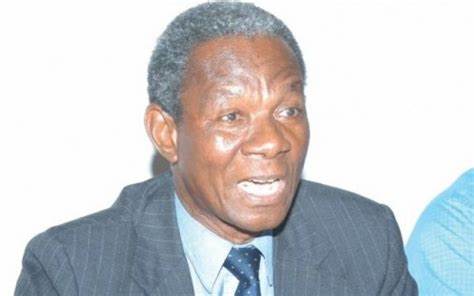Renowned economist, Kwame Pianim, has criticized the license revocation approach adopted by the Bank of Ghana and the Securities and Exchange Commission in cleaning up the financial sector.
As part of the efforts to sanitize the financial sector, the Central Bank and the SEC were forced to withdraw licenses of firms that were insolvent.
But speaking at the Tesah Capital Webinar on “investing in the financial sector post clean up”, Mr. Pianim said this should have been the last approach.
He also raised issues about the lack of regulatory coordination of the sector.
“I think that what happened in the past was due partly to lack of jurisdiction. With some of the ponzi schemes, it was not clear whether the Bank of Ghana or the Securities Exchange Commission was to regulate them.”
“Revoking a license is not the right way to do to these companies. The idea is to be there, guide them when they are going wrong and let them know that you’re monitoring their accounts so if they’re not paying their bills, you are going to deal with them,” he said.
Meanwhile, the Deputy Director General of the Securities and Exchange Paul Ababio has been giving details on payment to be made to customers of Black Shield Capital.
“Gold Coast is still in court with us so we haven’t got a liquidation order for them. So, on that side, it’s a partial bailout but once we secure the liquidation order or know the outcome, we’ll know the way forward.”
“What is happening now is that those we have liquidated are those we bring into the full bailout. So those who do not have will be in the partial bailout until it is completed,” he said.
Financial sector clean-up
On Monday August 14, 2017, the BoG revoked the licenses of two prominent indigenous banks – Capital Bank and UT Bank.
At the same time, the Central Bank had approved a Sale and Purchase Agreement that allowed GCB Bank to immediately take over the assets of the distressed banks.
It followed with subsequent revocation of licenses of uniBank, The Royal Bank, Beige Bank, Sovereign Bank, and Construction Bank that were merged into Consolidated Bank Ghana (CBG).
Governor, Dr. Ernest Addison explained at a press briefing that these banks were vulnerable with inadequate capital, high levels of non-performing loans, and weak corporate governance.
Latest Stories
-
NPP youth wing damns arrest of Fante Comedy, Akosua Jollof and Sir Obama Pokuase
8 minutes -
Helicopter crash: Obuasi West MCE explains why remains were carried in sacks
14 minutes -
Water supply interruption to affect parts of western Accra on August 13
26 minutes -
Police arrest NPP acitivist ‘Sir Obama Pokuase’ over illegal arms display
32 minutes -
Gov’t engages international experts to probe August 6 military helicopter crash – Brogya Genfi
33 minutes -
Our last call lasted only 16 seconds – MCE on conversation with late Samuel Aboagye
36 minutes -
Nana Konadu Agyeman-Rawlings lays wreath in honour of helicopter crash victims
41 minutes -
BoG targets credit risk, liquidity and reserve requirements of banks in new regulatory measures
43 minutes -
Adom TV debuts ‘Girls Can Talk’ show for unfiltered dialogue on women’s issues
1 hour -
Poetry and visual art intertwine at ‘the triune being’ exhibition
1 hour -
Hundreds of NPP youth organisers pick nomination forms for Bawumia at party HQ
1 hour -
6 life-changing lessons from Greater Works 2025 Conference you can apply today
1 hour -
Retired Air Force officer urges patience as Adansi helicopter crash black box undergoes analysis
1 hour -
PNP rejects temporary fund for air crash victims’ families, demands permanent welfare law
2 hours -
Retired Air Force officer downplays severe weather as possible cause of helicopter crash
2 hours

